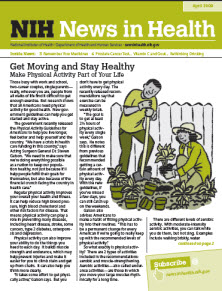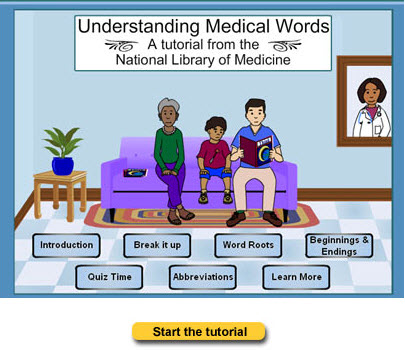
Take this brief quiz to see how much you really know about all the latest changes to MedlinePlus.gov.
1) Which statements below are true of collections and clusters in the search results of MedlinePlus.gov?
a) Collections break the results into subsets from the major areas within MedlinePlus
b) Clusters are grouping of items with similar concepts found within the text
c) Collections are groupings of items with similar concepts found within the text
d) Clusters break the results into subsets from the major areas within MedlinePlus
e) A and B
2) Which section on MedlinePlus.gov has a new look?
a) Interactive tutorials
b) Encyclopedia
c) Dictionary
d) Surgery Videos
3) How many days are news items archived for?
a) 90 in English and Spanish
b) 90 in English / 30 in Spanish
c) 30 in English / 90 in Spanish
d) 30 in English and Spanish
4) Which part of MedlinePlus is now also available in Spanish?
a) Directories
b) MedlinePlus Magazine
c) Go Local
5) What is RHIN and where will you find it on MedlinePlus?
a) Refugee Health Information Network; a multilingual resource on the Multiple Languages page
b) Resources for Health Information Network; on the health topics page
c) Roundtable on Health Interests of the Nation; on the health topics page
6) Which of the following search strategies are possible with the MedlinePlus search box?
a) Phrase searching, example “genetic brain disorders”
b) Wildcards, example leuko*
c) Boolean searching with OR, NOT
d) All of the above
7) Is it possible to restrict a search within MedlinePlus to a specific web site?
a) Yes
b) No
ANSWERS (in bold)
1) Which statements below are true?
a) Collections break the results into subsets from the major areas within MedlinePlus
b) Clusters are grouping of items with similar concepts found within the text
c) Collections are groupings of items with similar concepts found within the text
d) Clusters break the results into subsets from the major areas within MedlinePlus
e) A and B
2) Which section on MedlinePlus has a new look?
a) Interactive tutorials
b) Encyclopedia
c) Dictionary
d) Surgery Videos
3) How many days are news items archived for?
a) 90 in English and Spanish
b) 90 in English / 30 in Spanish
c) 30 in English / 90 in Spanish
d) 30 in English and Spanish
4) Which part of MedlinePlus is now also available in Spanish?
a) Directories
b) MedlinePlus Magazine
c) Go Local
5) What is RHIN and where will you find it on MedlinePlus?
a) Refugee Health Information Network; a multilingual resource on the Multiple Languages page
b) Resources for Health Information Network; on the health topics page
c) Roundtable on Health Interests of the Nation; on the health topics page
6) Which of the following search strategies are possible with the MedlinePlus search box?
a) Phrase searching, example “genetic brain disorders”
b) Wildcards, example leuko*
c) Boolean searching with OR, NOT
d) All of the above
7) Is it possible to restrict a search within MedlinePlus to a specific web site?
a) Yes; example breast cancer site: cancer.gov
b) No








